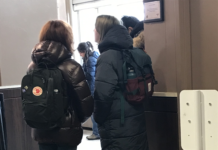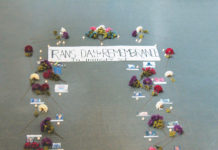For anyone who has researched UW’s history, it would come as no surprise to learn that many large-scale concerts have taken place on campus over the years. In a post-pandemic, inflation-riddled world, however, the concert scene on campus looks quite different – in short, it doesn’t look like much at all.
The last major concert organized in connection with UW took place on Columbia Lake during Waterloo’s Canada Day celebrations in 2017, while a fall welcome week concert hasn’t occurred since 2014. Though concerts still take place on campus, they’re smaller in scale and usually organized by student groups. Ultimately, it’s clear that bringing outside acts onto campus has become much more difficult than it once was.
Regardless of these challenges, UW students have expressed — often on online platforms like Reddit — that the desire for concerts on campus hasn’t simply faded away. In many of these posts, students appeal to the Waterloo Undergraduate Student Association (WUSA), asking to consider hosting a concert. Tham Sivakumaran, who previously sat on WUSA’s board of directors, took to Reddit to ask students more about what they wanted to see and whether they would be willing to pay more for events. One user, u/North-Reaction-6160, responded that “people will pay extra for cooler events, [WUSA] just need[s] to host them.”
WUSA has also attempted to gather student feedback about event programming and other operations through their Representative Survey Platform. WUSA’s spokesperson stated that current feedback “indicates [students] are interested in WUSA continuing to offer a range of events.” Indeed, many students seem to desire a wider “range” of opportunities on campus, with students frequently lamenting the lack of social life at UW compared to other institutions. Sivakumaran echoed these feelings: “Waterloo has that reputation of [being a] study school, and if you really want to have fun and go to parties and have a good time, then you go to Laurier.”
This was part of Sivakumaran’s motivation behind creating the Reddit post. “I wanted to frame it more as, what are [the] events you actually want to see that would actually make being on our campus fun and not [causing you to be] running off to another school?” Larger-scale rankings might also point out this trend: while Waterloo placed third overall in Maclean’s 2024 university rankings, it placed 12th in the student services category.
There are student-run clubs which attempt to keep concerts alive on campus, however. One such group is JamNetwork, a club which prides itself on welcoming students of all musical skill levels. Club co-president Bastian Perez and secretary Imaan Gill spoke about the club’s effort to host music-based events both on and off campus over the last few years in order to best serve the student community. “All of our concerts have done pretty well in terms of large-scale attendance… I think that’s definitely because we’ve been able to [fill] this gap in entertainment programming,” Gill said.
Though JamNetwork has begun expanding their operations off-campus (for instance, partnering with local businesses like the Princess Cinemas to host concerts), Perez and Gill emphasized the value of campus-based events, noting that they are more easily accessible for students. Having entertainment on campus, Perez added, also increases student awareness about what clubs like JamNetwork have to offer: “In terms of student life at Waterloo, I feel like people don’t realize that they want [concerts] or that they would be benefitted by big events. [It’s] like a demand that’s sort of not realized because we’ve gotten so used to there not being big [events] like that.”
However, actually putting on these larger-scale events can be a challenging endeavour for clubs at UW. Event proposals must be submitted to WUSA at least one week in advance of the event taking place, but this process can take longer depending on the scale of the proposal. Gill explained that when JamNetwork hosts Jamboree — the club’s large end-of-term concert — they reach out to WUSA’s clubs manager well in advance in order to gain approval and arrange logistical details such as event financing. “That’s the part where there isn’t really a specific process per se, it gets a bit more vague,” they noted.
Gill also spoke about the necessity for clubs to reach out to various branches within WUSA and the university at large, with departments like Plant Operations being responsible for booking spaces across campus. For events of any kind, all ticketing and transactions must also be filtered through WUSA. Clubs have to book a portable payment machine from WUSA in advance, and use it for any transactions during the event. These logistical requirements for making a profit might be one reason that clubs shy away from transaction-based entertainment events on campus. Gill explained that when using the WUSA machines, there are “sometimes some delays” with having the money transferred into the club’s account after the event.
Other logistical factors for clubs include accessing various types of equipment, as well as having access to people who are able to transport and operate the equipment during the event. Finances, however, are still the biggest consideration when planning events. “Right now, it really seems like the thing that’s limiting [JamNetwork] the most would just be funding,” Perez concluded.
“There’s a lot of places on campus… that are just inaccessible because of how expensive they are, like the Humanities Theatre or [the Theatre of the Arts], for instance, that kind of pushes us to do stuff off campus because eventually we’ve started to exhaust a lot of the cool places on campus,” Gill explained. While the Humanities Theatre and Theatre of the Arts do waive rental costs for student clubs, they would still be required to pay for any necessary equipment or labour.
It’s a similar story for the event planners at WUSA. “It’s the same problem as literally everything else… we were being told [that the problem] is that inflation is also hitting the events sector,” Sivakumaran added. Commenting on the lack of concerts at UW compared to other universities such as Wilfrid Laurier University, a spokesperson for WUSA said that the changing nature of the industry has made it difficult to find artists that are both well known and within budget. “A concert with a reputable name costs a significant amount of money and would impact the event’s affordability or reduce other programming throughout the year due to the increased cost for one event.” Sivakumaran added that: “Waterloo has a unique problem because we are a co-op school,” and explained that the three-semester model can create further budget limitations.
In addition to the cost of renting spaces, the number of spaces themselves might simply be dwindling. One of the places on campus that was historically used to host events for students was Federation (Fed) Hall, which opened in 1984. The building was completely paid for by UW students and operated for 27 years as a student nightclub managed by Feds, the student federation prior to WUSA. That all changed in 2012 when the university chose not to renew Feds’s lease. Management of the space was then transferred to Food Services, which still manages Fed Hall today. Though Fed Hall can still be booked for events, it is a more complicated and expensive process for students now that they no longer manage it. Perhaps the loss of this event space (one of the largest on campus) is yet another obstacle facing students who wish to generate more entertainment experiences on campus.
One change students might look towards in the coming academic year is the one-dollar increase to WUSA’s events budget, which was approved during WUSA’s annual general meeting in March. Though a three-dollar increase for subsequent years was not approved, Sivakumaran hopes that the one dollar can motivate change once it comes into effect in the fall. “[Students] approved the dollar and [they] said first let WUSA prove that yes, we can do bigger, better events.” As for increases to WUSA’s event budget after that, it will depend on how students vote in next year’s annual general meeting.



























